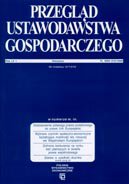Przegląd Ustawodawstwa Gospodarczego nr 07/2012
Rok wydania: 2012
Miejsce wydania: Warszawa
Oprawa: miękka
Przegląd Ustwodawstwa Gospodarczego nr 7/2012
Spis treści
Igor Postuła, Uniwersytet Warszawski
Problemy wynagradzania członków organów spółek Skarbu Państwa
Summary
The problems of remuneration policy in Polish state owned companies’ management and supervisory boards.
The article concerns the regulation on remuneration policy of management and supervisory boards’ members in state owned companies’ (SOCs). This article aims at verifying whether this regulation is conducive to attain three main goals. Firstly, to reduce agency problem within the SOCs that is to make boards members act not in their own business but in the interests of the companies and their shareholders. Secondly, to ensure that boards are composed of persons featuring adequate skills, knowledge and status. Thirdly, the regulation should not induce boards’ members to circumvent its provisions by seeking the opportunity to earn extra money within or outside the SOCs. Author did the interdisciplinary research that consists of regulation analysis and large sample analysis conducted among SOCs’ management and supervisory boards’ members. On the basis of the research findings author submits new solutions of the regulation on SOCs’ boards‘ members remuneration.
Beata Kucia-Guściora, Katolicki Uniwersytet Lubelski im. Jana Pawła II
Kształtowanie się skali progresywnej w polskim podatku dochodowym od osób fizycznych na tle tendencji w państwach członkowskich UE
Summary
The formation of a progressive scale in the Polish Personal Income Tax in the against trend in the EU Member States
The following paper attempts to assess the process of creating progressive tax rates and tax allowance in personal income tax in Poland. In the period of 20 years when the law has been in force there have been introduced many changes concerning both the shape of this progressive tax and increasing percentage rates. However, we cannot clearly state that all those changes aimed at realization of the target scale of taxation. Quite frequently introduced reforms served rather current fiscal and political needs. As a result, the recently binding two-tier progressivity is de facto more similar to flat tax rate system. Thus, a question arises what the final shape of taxation scale in personal income tax should be. The author calls for a revision of graduated taxation and changes either towards flat tax or towards expansion of progressive taxation by increasing percentage rates and lowering tax rates. Experience of EU member states provides arguments supporting the need for changes. Such alterations should also concern tax exemption. Polish personal income tax uses quite low tax allowance, which together with the applied model of tax deductions cannot be seen as a provision of basic needs. The author refers also in this case to EU member states practices and opts for increase of tax allowance as a multiple of the minimum wage. The presented comments should become a talking point in the discussion about future income tax on individuals, especially in the context of announced and expected reforms of public finances, including taxes.
Grzegorz Materna, Instytut Nauk Prawnych PAN
Sądowy nadzór nad wykonywaniem kontroli (przeszukania) u przedsiębiorcy w toku postępowania przed Prezesem UOKiK
Summary
Juridical supervision on control (search) execution in entrepreneur’s seat during the proceeding before President of Consumer and Competition Protection Office
The article discusses the judicial review by courts of the performance of the inspection (search) in the course of proceedings before the President of the Office of Competition and Consumer Protection. Analysis of the rules concerning performance of the inspection in antitrust cases leads to the conclusion that the scope of the judicial review is incomplete and also unclear. In writer’s view the comprehensive inspections procedure should be provided for in the Act of 16 February 2007 on Competition and Consumer Protection (O.J. L. of 2007 No 50 item 331). The revised Act on Competition and Consumer Protection should in particular provide for the right of the inspected party, whose rights have been violated, to appeal any decision or act performed during the inspection. To ensure the effectiveness of the inspection, the appeal should not stop it. The revised Act on Competition and Consumer Protection should also resolve doubts concerning the scope of the Legal Professional Privilege in Polish antitrust law.
KONSULTACJE
Agata Prokop, Uniwersytet Jagielloński
Powstanie spółki europejskiej
Summary
The erection of European company
The distinguishing role of companies in the economic circulation was noticed by the European Council of Ministers, that after 30 years of discussion adopted the Statute for the European Company on 8 October 2001. European company is one of the pan-European forms of running business throughout the European Union. The rules of the Regulation 2157/2001 are in force in all Member States of the European Union and are supposed to ease the conquest of EU markets.
The SE Statute limits the ring of objects that can establish SE. It is a closed catalogue, that composes only of national joint-stock companies, with the exception of the holding company, that can be created on the basis of the limited liability company.
The SE is a legal form, that in the intention of its’ creators, was supposed to become attractive for the entrepreneurs acting in few Member States. As of June 2010 a total of 595 SEs were registered in EU and EEA Member States, with substantial majority in Germany and the Czech Republic. It seems that it is not the result anticipated by the European legislator.
Few years of functioning of this type of company has not contributed to substantial rise in the number of SEs, the European company is established fairly often in only few EU States, in other countries, including Poland, it is practically unknown.
GLOSA
Mariusz Fras, Uniwersytet Śląski
Glosa aprobująca do wyroku Sądu Najwyższego z dnia 19 października 2011 r., II CSK 86/11
| Inpost Paczkomaty | 14 zł |
| Kurier Inpost | 14 zł |
| Kurier FedEX | 14 zł |
| Odbiór osobisty | 0 zł |
| Darmowa dostawa | od 250 zł |
| Darmowa dostawa w Klubie Książki | od 200 zł |

